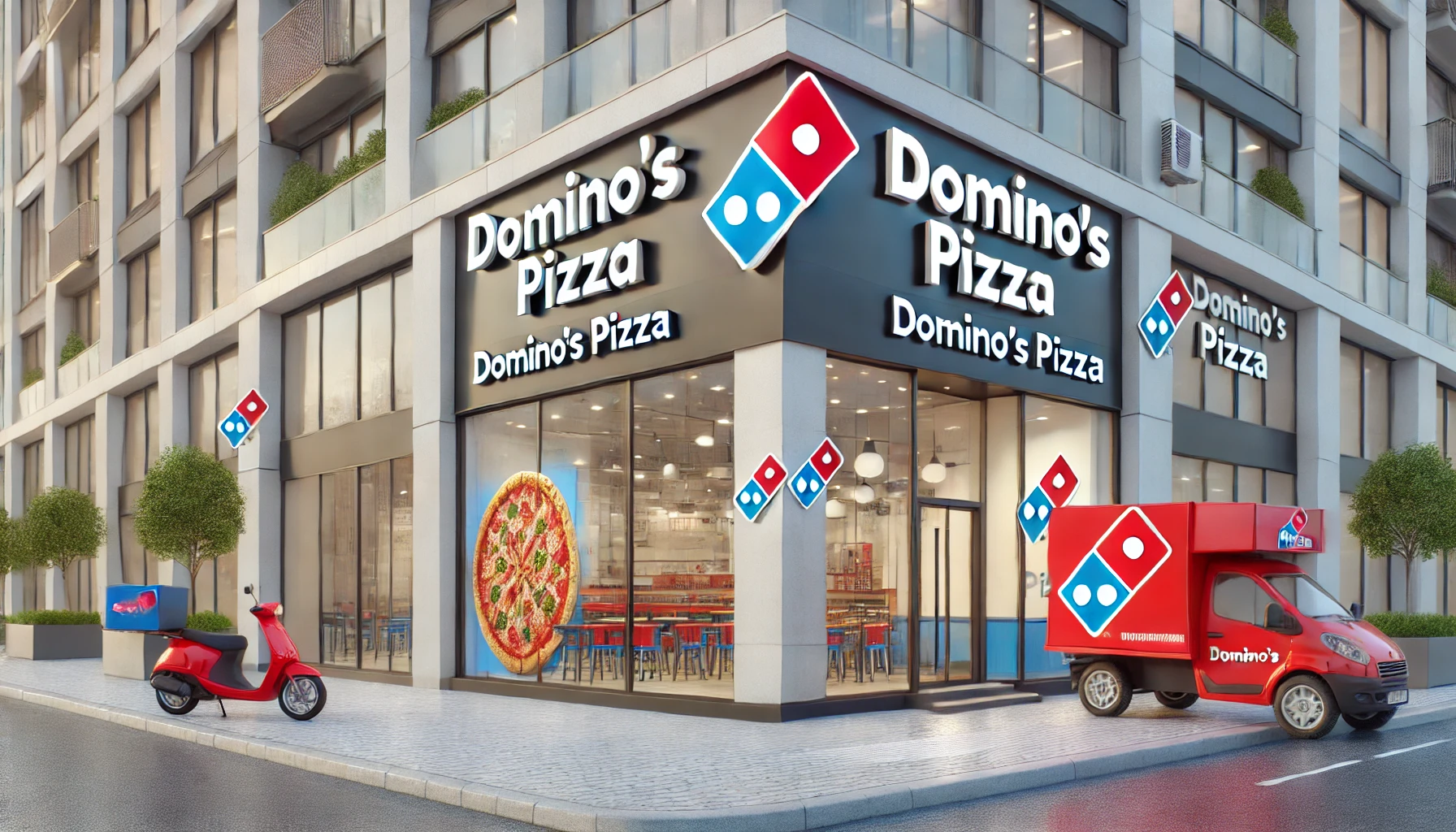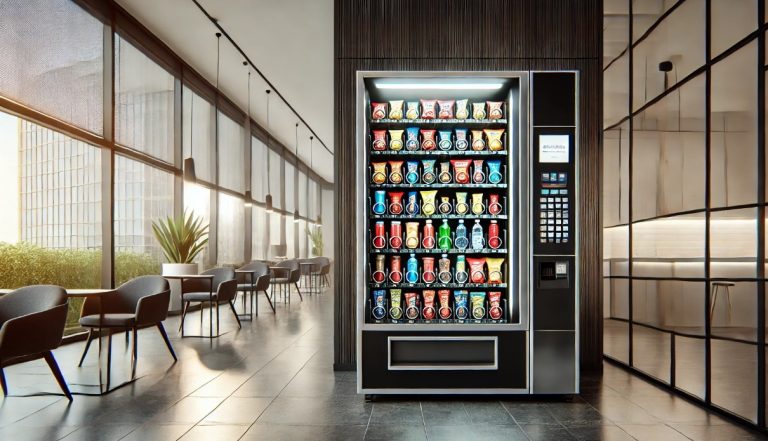Domino’s Pizza Franchise Cost 2025: Is It Worth the Investment?
Are you considering investing in a Domino’s Pizza franchise in the UK? With its strong brand presence, proven business model, and high consumer demand, Domino’s offers a lucrative opportunity for entrepreneurs.
However, before diving into this investment, it’s essential to understand the franchise costs, financial requirements, profitability, and operational commitments.
How much does it cost to open a Domino’s franchise in 2025? What are the potential profits and challenges? Who qualifies to apply for a franchise, and what is the approval process?
This guide will answer these questions, helping you determine whether a Domino’s franchise is the right business opportunity for you.
By the end, you’ll have a comprehensive understanding of the investment, risks, and rewards associated with owning a Domino’s franchise.
What Is the History of Domino’s Pizza?

Domino’s Pizza was founded in 1960 in Ypsilanti, Michigan, by Tom and James Monaghan. Originally named DomiNick’s, it was later rebranded as Domino’s after Tom Monaghan took full ownership.
The brand grew rapidly due to its 30-minute delivery guarantee, revolutionising the pizza industry. Domino’s expanded internationally in the 1980s, entering the UK market in 1985.
Since then, it has become the UK’s largest pizza delivery chain, with over 1,300 stores and 35,000 employees. The brand’s success is driven by technological advancements, including online ordering and AI-powered delivery systems.
Today, Domino’s operates in 90+ countries, selling millions of pizzas daily. Its commitment to speed, quality, and innovation has solidified its position as a global leader.
In the UK, Domino’s continues to dominate the fast-food sector, making it one of the most sought-after franchise opportunities.
How Did Domino’s Become a Leading Franchise Brand?
Domino’s became a franchise-driven business in 1967, allowing rapid expansion across the US and internationally. Its success is built on a scalable business model, strong brand recognition, and efficient delivery systems.
The introduction of digital ordering, mobile apps, and AI-powered tracking has given Domino’s a competitive edge. A major factor behind its growth is its focus on customer convenience.
Domino’s pioneered fast delivery services, ensuring hot pizzas arrive within 30 minutes. Its franchise support system provides training, marketing, and supply chain management, attracting new franchisees.
In the UK, Domino’s dominates the pizza delivery market, selling a pizza every three seconds. With its innovative digital strategy, data-driven operations, and strong franchise network, it continues to outperform competitors like Pizza Hut and Papa John’s, making it a global industry leader.
Why Should You Start a Domino’s Franchise in the UK?

Domino’s is the leading pizza delivery brand in the UK, making it a highly attractive franchise opportunity. With over 1,300 stores and strong brand recognition, franchisees benefit from an established customer base, proven business model, and extensive corporate support.
The franchise offers high revenue potential, with annual sales ranging between £750,000 and £1.5 million per store. Franchisees enjoy operational support, marketing assistance, and advanced digital systems that drive online sales.
Additionally, Domino’s low failure rate (around 1%) makes it a safer investment compared to independent food businesses.
For entrepreneurs with prior Domino’s management experience, this franchise provides strong profit margins, scalable growth opportunities, and a recession-resistant business model.
While the initial investment is substantial, long-term profitability, brand strength, and corporate backing make it one of the best fast-food franchises in the UK.
How Much Does a Domino’s Pizza Franchise Cost in the UK?
Starting a Domino’s Pizza franchise in the UK requires a significant financial commitment. As of 2025, the estimated total investment ranges from £120,000 to £350,000.
The exact cost depends on several factors, including the location, store size, leasehold improvements, and initial operational expenses.
Additionally, franchisees must meet financial eligibility criteria, including a minimum liquid capital of £120,000 and a net worth of at least £250,000.
While the initial investment is high, Domino’s franchisees benefit from an established brand, strong customer demand, and extensive corporate support, making it a profitable long-term business opportunity.
Below is a detailed breakdown of the costs associated with opening a Domino’s franchise in the UK.
Breakdown of Key Franchise Costs:
| Expense Category | Low Estimate (£) | High Estimate (£) | Description |
| Franchise Fee | 28,000 | 32,000 | One-time fee for brand rights and business model access |
| Leasehold Improvements | 5,000 | 350,000 | Renovation and setup of store space |
| Furniture & Equipment | 62,000 | 145,000 | Ovens, prep stations, storage units, POS systems |
| Signage & Branding | 5,200 | 32,000 | External and internal branding elements |
| Initial Inventory & Supplies | 2,750 | 6,500 | First stock of ingredients, packaging, and store essentials |
| Opening Marketing & Promotion | 0 | 3,000 | Initial advertising and promotional campaigns |
| Training & Miscellaneous Costs | 1,000 | 7,000 | Franchisee training, licensing, and legal fees |
| Additional Working Capital (First 3 Months) | 10,000 | 73,000 | Buffer for operational expenses like salaries, utilities, and rent |
Explaining the Major Costs:
- Franchise Fee (£28,000 – £32,000): This is the one-time payment to Domino’s for brand licensing, access to proprietary business systems, training programs, and operational support. The fee is non-refundable and is required before opening the store.
- Leasehold Improvements (£5,000 – £350,000): The cost of renovating and preparing the store varies depending on location, property condition, and layout requirements. Domino’s assists franchisees in selecting an optimal site and negotiating lease agreements.
- Furniture, Fixtures & Equipment (£62,000 – £145,000): Franchisees must purchase essential equipment such as pizza ovens, refrigeration units, preparation tables, and point-of-sale (POS) systems. The cost varies based on store size and the need for new or refurbished equipment.
- Signage & Branding (£5,200 – £32,000): This includes exterior and interior signage, digital menu boards, and store branding elements. Costs depend on store location and compliance with Domino’s corporate design standards.
- Initial Inventory & Supplies (£2,750 – £6,500): Franchisees must stock up on essential ingredients such as dough, cheese, toppings, sauces, and packaging materials. Inventory costs fluctuate depending on order volume and supplier agreements.
- Opening Marketing & Promotion (£0 – £3,000): New franchisees are expected to invest in local advertising campaigns to attract customers upon store launch. While Domino’s provides national marketing support, franchisees contribute to location-specific promotions.
- Training & Miscellaneous Costs (£1,000 – £7,000): Domino’s provides a 4-week franchise training programme, covering pizza-making, customer service, management, and business operations. Additional costs may include legal fees, licensing, and store-specific customisations.
- Working Capital for First 3 Months (£10,000 – £73,000): New franchisees need additional funds to cover staff wages, rent, utility bills, and unforeseen expenses in the initial months. This ensures smooth business operations until the store becomes profitable.
What Are the Other Financial Considerations?
Aside from the startup costs, franchisees must account for ongoing fees that impact long-term profitability:
- Royalty Fee: 5.5% of weekly sales (paid to Domino’s for continued brand usage and corporate support).
- Advertising Contribution: 4% of weekly sales (goes towards national and regional marketing efforts).
- Technology & Software Fees: Includes POS system maintenance, digital order fees, and IT support (varies by store).
Although opening a Domino’s Pizza franchise in the UK requires a significant upfront investment, the potential for strong sales, high profitability, and long-term brand growth makes it a lucrative business opportunity.
Entrepreneurs with sufficient capital and management experience can benefit from a well-established customer base and extensive corporate backing.
What Are the Financial Requirements to Open a Domino’s Franchise?

Before applying for a Domino’s Pizza franchise in the UK, potential franchisees must meet strict financial eligibility requirements.
This ensures that only financially stable investors with sufficient capital can successfully run a store. The financial requirements include:
What Are the Minimum Investment and Net Worth Criteria?
To qualify as a Domino’s franchisee, you must meet the following financial benchmarks:
| Financial Requirement | Minimum Amount (£) | Purpose |
| Liquid Cash | 120,000 | Immediate access to funds for initial expenses |
| Net Worth | 250,000 | Total personal/business assets minus liabilities |
| Initial Investment | 120,000 – 350,000 | Required for franchise setup, including franchise fee and operational costs |
Why Are These Financial Requirements Important?
- Domino’s ensures that franchisees have enough financial resources to cover startup costs, operational expenses, and unexpected challenges.
- The liquid cash requirement (£120,000) ensures that franchisees can invest immediately without relying solely on loans.
- A minimum net worth of £250,000 demonstrates financial stability and ensures the franchisee can sustain business growth.
Can You Get Financing to Open a Domino’s Franchise?
While Domino’s does not directly offer financing, franchisees can explore third-party funding options such as:
- Franchise Business Loans: Many UK banks and lenders provide franchise-specific loans.
- Government Grants & Funding: Some entrepreneurs may qualify for small business grants.
- Private Investors: Investors or business partners may provide additional funding.
Does Domino’s Offer Financial Support?
Unlike some franchises, Domino’s does not offer direct financial assistance. However, the company does provide support in site selection, lease negotiations, marketing, and operational training, helping franchisees maximise their investment potential.
A solid financial foundation is essential for franchise approval. Those who meet the criteria and secure additional funding when needed can proceed with the next steps in the franchise application process.
What Are the Ongoing Fees for a Domino’s Franchise?
Owning a Domino’s franchise comes with ongoing costs beyond the initial investment. These expenses cover branding, corporate support, technology, and marketing, ensuring that every Domino’s location maintains high standards.
Breakdown of Ongoing Fees:
| Fee Type | Amount | Purpose |
| Royalty Fee | 5.5% of weekly sales | Paid to Domino’s for continued brand support |
| Advertising Fund | 4% of weekly sales | Contribution to national marketing campaigns |
| Advertising Co-op Fund | 1.4% of weekly sales | Regional/local marketing initiatives |
| PULSE Initial License Fee | £4,200 (one-time) | Payment for Domino’s proprietary POS system |
| PULSE Software Fees | £1,357 per year | Covers POS software updates and support |
| Annual Software Fee | £743 per store after first year | Ongoing system maintenance costs |
| Help Desk Support Fee | £44 per call, £28 per chat | Customer service and IT assistance |
| Technology Service Fee | £0.355 per digital order | Fee for digital order processing |
| Credit Card Processing Fee | £0.525 per transaction | Covers payment processing costs |
Understanding These Costs:
1. Royalty Fee (5.5% of Weekly Sales)
- This is a standard industry practice, ensuring franchisees benefit from corporate support, training, and operational guidance.
- The fee covers access to business strategies, supply chain management, and brand innovation.
2. Advertising Fees (Total 5.4% of Weekly Sales)
- 4% National Advertising Fund: Used for TV, digital, and print marketing campaigns.
- 1.4% Co-op Fund: Used for local promotions, store-specific discounts, and regional marketing efforts.
3. Technology & Software Fees
- Domino’s uses a proprietary PULSE point-of-sale (POS) system, essential for order tracking and inventory management.
- Franchisees pay £4,200 initially for the system, plus an annual maintenance fee (£743 per store after year one).
4. Transaction & Support Fees
- Credit Card Processing Fee (£0.525 per transaction): Covers digital and in-store payment processing.
- Technology Service Fee (£0.355 per order): Applied to online and app-based orders to support digital infrastructure.
- Help Desk Support Fee (£44 per call, £28 per chat): For troubleshooting and IT support.
How These Fees Impact Profitability?
While these fees may seem high, they help drive brand growth, customer loyalty, and streamlined operations. Domino’s extensive marketing efforts and digital innovations contribute to high sales volumes, helping franchisees offset these ongoing costs with strong revenues.
Successful franchisees factor these expenses into their business plan, ensuring long-term profitability and operational efficiency.
How Profitable Is a Domino’s Franchise in the UK?

Domino’s is one of the most profitable fast-food franchises in the UK, with high revenue potential and strong brand demand.
The profitability of a Domino’s franchise depends on several factors, including location, store performance, operational efficiency, and cost management.
While individual results vary, franchisees typically earn between 10% to 20% net profit margins on sales.
What Are the Average Revenue and Profit Estimates?
| Financial Metric | Estimated Value |
| Annual Gross Sales (Per Store) | £750,000 – £1,500,000 |
| Net Profit Margin | 10% – 20% |
| Annual Profit (After Expenses) | £115,000 – £500,000 |
| Return on Investment (ROI) | 4 – 6 years |
Factors That Influence Profitability:
- Store Location & Foot Traffic: Stores in high-density urban areas generate higher sales than those in less populated regions. Visibility, parking accessibility, and nearby businesses impact order volume.
- Operational Efficiency: Well-trained staff and optimized delivery processes improve customer service and reduce waste. Efficient inventory management minimizes losses and improves cost control.
- Marketing & Promotions: Franchisees who invest in local advertising and digital marketing see increased brand awareness. Discounts, special offers, and partnerships with delivery platforms boost customer retention.
- Competition & Market Demand: High demand for fast, convenient food delivery supports consistent sales growth. Strong brand recognition gives Domino’s a competitive edge over independent pizza shops.
How Long Does It Take to Break Even?
Most Domino’s franchisees recoup their initial investment within 4 to 6 years, depending on store performance. Strong sales and efficient cost management accelerate profit growth.
Is a Domino’s Franchise a Good Investment?
For entrepreneurs who meet the financial and operational requirements, a Domino’s franchise offers a stable, profitable business model with low failure rates and strong corporate support.
What Are the Steps to Apply for a Domino’s Franchise?
Becoming a Domino’s franchisee involves a structured multi-step application process, ensuring that only qualified candidates are approved. Unlike many franchises, Domino’s requires prior experience in store management before granting a franchise license.
Step-by-Step Guide to Owning a Domino’s Franchise:
| Step | Process Description |
| 1. Meet Eligibility Requirements | Minimum 1-year experience as a general manager or supervisor at an existing Domino’s store. |
| 2. Financial Qualification | Meet financial criteria: £120,000 in liquid assets and £250,000 net worth. |
| 3. Submit Franchise Application | Complete the official application through Domino’s UK Franchise Department. |
| 4. Franchise Pre-Qualification | Domino’s evaluates business acumen, experience, and financial capability. |
| 5. Attend Franchise Management School (FMS) | A 4-week intensive training programme covering store operations, marketing, and finance. |
| 6. Secure Store Location & Lease Agreement | Domino’s assists in site selection and property lease negotiations. |
| 7. Sign Franchise Agreement & Pay Fees | Official franchise contract signed; fees and initial investment paid. |
| 8. Store Setup & Training Completion | Equipment installation, staff hiring, and pre-launch training conducted. |
| 9. Grand Opening & Operational Support | Domino’s provides marketing support and ongoing business assistance. |
How Long Does the Franchise Approval Process Take?
- The entire process, from application to store opening, takes between 6 to 12 months.
- Candidates must complete training and meet operational requirements before approval.
What Support Does Domino’s Provide?
- Site Selection Assistance: Helps franchisees choose high-traffic locations.
- Comprehensive Training: Covers business management, pizza-making, and customer service.
- Marketing & Brand Support: National and regional advertising to drive sales and customer engagement.
- Operational Guidance: Ongoing corporate support in supply chain management and business optimization.
Who Should Apply?
The ideal franchisee is someone with strong leadership skills, financial stability, and experience in food service or management. Domino’s prioritizes applicants who understand its operational model and are willing to be hands-on in daily store management.
What Are the Pros and Cons of Owning a Domino’s Franchise?

Advantages of Owning a Domino’s Franchise
- Strong Brand Recognition: Domino’s is a global leader in pizza delivery, with a loyal customer base in the UK.
- Proven Business Model: The franchise offers structured training, operational support, and established marketing strategies.
- High Revenue Potential: Stores generate consistent sales, with profit margins ranging from 10% to 20%.
- Marketing & Digital Advantage: 75% of Domino’s UK sales come from online and app orders, benefiting from advanced technology and strong digital presence.
- Ongoing Corporate Support: Franchisees receive continuous assistance in supply chain management, staff training, and operational improvements.
Challenges of Owning a Domino’s Franchise
- High Initial Investment: Requires £120,000 – £350,000 in startup costs, making it inaccessible for some investors.
- Strict Franchise Eligibility Criteria: Only applicants with at least 1 year of management experience at Domino’s are considered.
- Ongoing Fees & Royalties: Franchisees pay 5.5% royalty fees and 4% advertising contributions, reducing net profits.
- Demanding Operational Commitments: Requires hands-on management, making it unsuitable for passive investors. Franchisees must work long hours, especially on weekends and holidays.
- Highly Competitive Industry: The fast-food market is competitive, requiring consistent marketing and quality control to stay ahead.
Is It Worth the Investment?
Owning a Domino’s franchise is a profitable but demanding business opportunity. Entrepreneurs who meet the financial and experience requirements can benefit from strong brand recognition, corporate support, and long-term profitability.
However, it requires full commitment, hands-on management, and strategic cost control to maximize success.
Is a Domino’s Franchise the Right Investment for You?
Investing in a Domino’s franchise in the UK is a major financial and professional commitment. While the potential for profitability is high, the business requires hands-on management, operational efficiency, and strong leadership skills. It is best suited for individuals who:
- Have at least one year of experience in a Domino’s managerial role (a franchise requirement).
- Meet the financial eligibility criteria (£120,000 in liquid capital and £250,000 net worth).
- Are willing to commit to long working hours, especially during peak times like weekends and holidays.
- Possess strong business and leadership skills to manage staff, operations, and customer service.
- Have the ability to adapt to market trends and technological advancements (Domino’s relies heavily on online and app-based sales).
Who Should Think Twice Before Investing?
While the Domino’s franchise model is proven and profitable, it may not be suitable for everyone. You may want to reconsider if:
- You lack experience working in a Domino’s store in a managerial position (since external applicants are not eligible).
- You are looking for a passive investment Domino’s requires active involvement in store operations.
- You do not have the required financial resources to cover both startup costs and ongoing fees.
- You are not comfortable with strict corporate guidelines and operational standards that must be followed.
What Are Alternative Franchise Opportunities in the UK?

If a Domino’s franchise does not seem like the right fit, there are other food franchise opportunities available in the UK with lower financial requirements or more flexible management structures. Some alternatives include:
| Franchise Brand | Initial Investment (£) | Industry | Management Style |
| Pizza Hut Delivery | £130,000 – £250,000 | Pizza Delivery | Hands-on |
| Subway | £85,000 – £200,000 | Sandwiches & Fast Food | Semi-passive |
| Costa Coffee | £250,000+ | Coffee & Beverages | Hands-on |
| McDonald’s | £400,000+ | Fast Food | Hands-on |
| Greggs | £80,000 – £200,000 | Bakery & Snacks | Semi-passive |
A Domino’s franchise is a high-revenue, high-commitment investment. If you have the required experience, financial resources, and business acumen, it can be an excellent opportunity.
However, if you are looking for a lower-cost or semi-passive franchise, exploring other options may be more suitable.
What Are the Risks and Challenges of Owning a Domino’s Franchise?
Owning a Domino’s franchise in the UK comes with risks despite its strong brand and profitability. The pizza delivery market is highly competitive, with rivals like Pizza Hut, Papa John’s, and independent pizzerias offering similar services.
Franchisees must invest in local marketing and customer retention strategies to maintain market share. Operational challenges include high employee turnover, requiring continuous recruitment and training.
Additionally, rising costs of ingredients, wages, and rent can affect profit margins, making cost management essential. Franchisees must optimise expenses and pricing strategies to sustain profitability.
If a Domino’s store underperforms, corporate support is available, but consistent low sales could lead to closure. To mitigate risks, franchisees should focus on efficient operations, customer service excellence, and strong local engagement.
Proactive financial planning and adapting to market trends can significantly improve long-term success.
Conclusion
Owning a Domino’s franchise in the UK can be a highly profitable venture, but it requires significant investment, prior experience, and hands-on management.
With strong brand recognition, corporate support, and a tech-driven ordering system, Domino’s remains a dominant player in the fast-food industry.
While the initial costs and ongoing fees may seem high, the revenue potential and long-term growth opportunities make it an attractive business. However, competition, rising costs, and operational challenges must be carefully managed to ensure success.
If you meet the financial and experience requirements and are ready for a hands-on business commitment, a Domino’s franchise could be a rewarding investment.
Conduct thorough research, assess the risks, and ensure you’re prepared for the responsibilities of running a successful Domino’s franchise.
FAQs About Domino’s franchise cost
How much does a Domino’s franchise cost in the UK?
The total investment for a Domino’s franchise in the UK ranges from £120,000 to £350,000, depending on location, store size, and setup costs.
What are the financial requirements to become a Domino’s franchisee?
Applicants need £120,000 in liquid capital and a net worth of £250,000, along with prior management experience in a Domino’s store.
Can I own a Domino’s franchise without prior experience?
No, Domino’s requires at least one year of managerial experience at a Domino’s store before granting franchise approval.
How long does it take to open a Domino’s franchise?
The process, from application to store launch, typically takes 6 to 12 months, including training, site selection, and setup.
What are the ongoing fees for a Domino’s franchise?
Franchisees pay a 5.5% royalty fee, a 4% national advertising fee, and other operational costs like technology and support fees.
How profitable is a Domino’s franchise in the UK?
Successful stores generate annual gross sales between £750,000 and £1.5 million, with profit margins ranging from 10% to 20%.
What support does Domino’s provide to franchisees?
Domino’s offers site selection, training, marketing, supply chain management, and operational guidance to help franchisees succeed.







